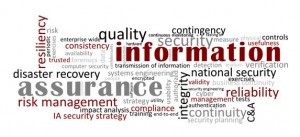 If you possess a highly detailed, precise and methodical personality, then pursuing a Master of Science degree in Information Assurance might just be the way to go. Various four-year institutions of higher learning across the United States offer degrees in this specialized field. Many people who wish to work in the information technology realm achieve Master’s degrees in Information Assurance.
If you possess a highly detailed, precise and methodical personality, then pursuing a Master of Science degree in Information Assurance might just be the way to go. Various four-year institutions of higher learning across the United States offer degrees in this specialized field. Many people who wish to work in the information technology realm achieve Master’s degrees in Information Assurance.
Goal of Information Assurance
Information Assurance is a discipline that focuses on the functioning of safe, dependable and efficient information systems. When students enter degree programs in Information Assurance, they learn how to properly create and design these systems. They also learn how to properly maintain and oversee them day in and day out. The primary priority of information assurance is to keep entities’ details protected.
Security Risks and Information Assurance
With a Master’s degree in Information Assurance, one can develop a strong understanding in assessing all of the potential risks that pertain to the data of any organization. Information Assurance programs delve deeply into concepts such as honesty, ethics, confidentiality, privacy and data verification. Students in Information Assurance learn how to apply these key concepts into information management, whether the information is processing or on its way to another destination.
Master’s Programs in Information Assurance
Programs in Insurance Assurance cover a diverse range of subjects. These subjects include computer security, computer forensics, wireless security, cryptography, security threats, digital forensics, safety within information systems, methods of intrusion, protection against intrusion and steganography, just to start. Many Master’s programs also offer specializations within the field, whether in security that relates to general finances or in banking specifically. The goal in learning all of these subjects is to learn how to promptly and effectively utilize technology in handling diverse information systems vulnerabilities. Credit requirements for these graduate programs vary depending on the school. They frequently require 36 credits, however.
Various Possible Career Options
If you earn a Master’s degree in Information Assurance, you open yourself up to a broad assortment of future career options. Some of these include careers as network administrators, chief security officers, system professionals, auditors, risk managers and analysts. The possible job trajectories go far beyond just those, however. Professionals in Information Assurance often even go on to work in government positions, such as those with the National Security Agency. If you decide that you want to earn a Master’s in this subject, make sure you fit the requirements first. To gain acceptance into one of these programs, you must have a Bachelor’s degree. It also frequently helps to have a strong grasps in mathematics and the fundamentals of information technology, as well. A background in discrete mathematics, for example, can often be beneficial.
Related Resource: Master’s in IT Specializations
Get on the Information Assurance Path
If the idea of protecting information for a living sounds appealing and enriching to you, earning a Master’s in the field will be the right position for you. The job outlook for Information Assurance is strong, as thousands of positions in the field remain open year after year. Some colleges and universities even offer online courses in the topic, which is a great benefit for those who have jam-packed schedules that call for educational flexibility.
